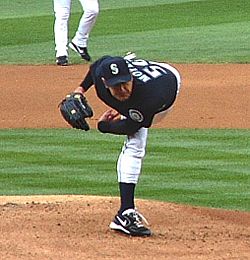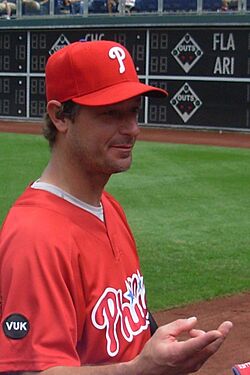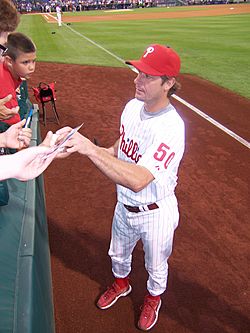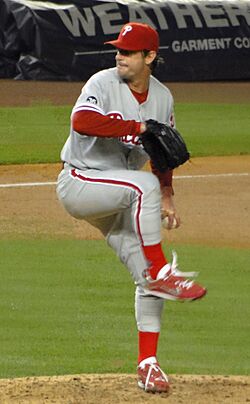Jamie Moyer facts for kids
Quick facts for kids Jamie Moyer |
|||
|---|---|---|---|
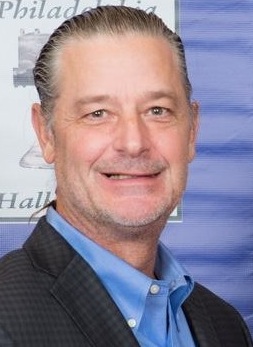
Moyer in 2018
|
|||
| Pitcher | |||
| Born: November 18, 1962 Sellersville, Pennsylvania, U.S. |
|||
|
|||
| debut | |||
| June 16, 1986, for the Chicago Cubs | |||
| Last appearance | |||
| May 27, 2012, for the Colorado Rockies | |||
| MLB statistics | |||
| Win–loss record | 269–209 | ||
| Earned run average | 4.25 | ||
| Strikeouts | 2,441 | ||
| Teams | |||
|
|||
| Career highlights and awards | |||
|
|||
Jamie Moyer, born on November 18, 1962, is a former professional baseball pitcher from America. He played for many teams during his 25-year career in Major League Baseball (MLB). These teams included the Chicago Cubs, Texas Rangers, St. Louis Cardinals, Baltimore Orioles, Boston Red Sox, Seattle Mariners, Philadelphia Phillies, and Colorado Rockies.
When he played his last game, he was the oldest player in the major leagues. He also had the most wins, losses, and strikeouts among active MLB pitchers. People compared him to Phil Niekro because he played for a very long time and retired at an older age. On April 17, 2012, Jamie Moyer became the oldest pitcher in MLB history to win a game. A month later, on May 16, 2012, he broke his own record for the oldest winning pitcher. He also set a new record for the oldest MLB player to get a run batted in (RBI). He holds the major league record for allowing the most home runs, with 522.
Moyer was chosen for the All-Star team in 2003 while playing for the Mariners. Jamie Moyer also received many awards for his good deeds and helping the community. These include the 2003 Roberto Clemente Award, the 2003 Lou Gehrig Memorial Award, the 2003 Hutch Award, and the 2004 Branch Rickey Award. Moyer is one of only 31 players in baseball history to have played in MLB games in four different decades. When he retired, Moyer had faced about 8.9% of all MLB hitters ever. He was inducted into the Mariners Hall of Fame in 2015.
Contents
- Early Baseball Days
- Professional Career Highlights
- Starting with the Chicago Cubs (1986–1988)
- Moving to the Texas Rangers (1989–1990)
- Short Stints with Other Teams (1991–1995)
- Time with the Boston Red Sox (1996)
- Success with the Seattle Mariners (1996–2006)
- Time with the Philadelphia Phillies (2006–2010)
- Playing for the Colorado Rockies (2012)
- Brief Returns to Other Teams (2012)
- Retirement and Beyond (2013)
- Broadcasting Career (2014)
- Pitching Style
- Personal Life
- See also
Early Baseball Days
Moyer went to Souderton Area High School in Souderton, Pennsylvania. There, he played baseball, basketball, and golf. In his junior year of baseball, he won 10 games and lost none. He also threw three no-hitters in a row.
Moyer then went to Saint Joseph's University and played college baseball for the Saint Joseph's Hawks baseball team. In 1984, he set new school records for wins (16), earned run average (ERA) (1.99), and strikeouts (90). In 1997, he was one of the first three people to be put into the Saint Joseph's Baseball Hall of Fame. In 2018, his jersey number, 10, was retired. This means no other Saint Joseph's baseball player will wear it.
Professional Career Highlights
Starting with the Chicago Cubs (1986–1988)
The Chicago Cubs picked Moyer in the sixth round of the 1984 draft. He was named a New York–Penn League All-Star in 1984. Moyer played his first major league game with the Cubs on June 16, 1986. He played against Steve Carlton and the Philadelphia Phillies and earned his first win. On August 16, he threw his first shutout against the Montreal Expos. He was also the starting pitcher for the Cubs when Greg Maddux played his first major league game.
In 1987, Moyer had 147 strikeouts, which was tenth in the National League. He won 12 games and lost 15. He also lost 15 games in 1988, winning only nine. Even with a losing record, Moyer improved his ERA to 3.48. He also walked fewer batters, giving only 55 base on balls compared to 97 the year before.
Moving to the Texas Rangers (1989–1990)
After his best season in 1988, the Cubs traded Moyer, Rafael Palmeiro, and Drew Hall to the Texas Rangers. In return, the Cubs received Mitch Williams, Paul Kilgus, Curtis Wilkerson, Steve Wilson, Luis Benitez, and Pablo Delgado.
Moyer was on the disabled list for most of 1989 because of a sore left shoulder. In 1990, Moyer spent some time in the bullpen before becoming a starting pitcher again.
Short Stints with Other Teams (1991–1995)
After the 1990 season, Moyer became a free agent and signed with the St. Louis Cardinals. He started seven games for the Cardinals in 1991 before being sent to the minor leagues on May 24. He was released on October 14.
In 1992, Moyer went to spring training with the Chicago Cubs. However, he was released and spent the rest of the season in the minor league system of the Detroit Tigers.
On December 18, 1992, Moyer signed with the Baltimore Orioles. Moyer started the 1993 season in the Orioles' minor leagues. He was called up to the main team on May 30. He tied his best number of wins with 12 and had his lowest ERA of 3.43. The 1994 season was shorter due to a strike, and his ERA went up to 4.77. However, he was third on the Orioles' team in innings pitched. In 1995, Moyer was in the Baltimore bullpen again. But he worked his way back into the starting rotation.
Time with the Boston Red Sox (1996)
The Boston Red Sox signed Moyer on January 2, 1996. Moyer played in 23 games for Boston, starting 10 of them.
Success with the Seattle Mariners (1996–2006)
Joining the Mariners and Early Success (1996–1999)
In the middle of the 1996 season, the Red Sox traded Moyer to the Seattle Mariners on July 30. They received outfielder Darren Bragg in return. In Seattle, Moyer started 11 games and had a record of 6 wins and 2 losses. Moyer's total record for both teams was 13 wins and 3 losses, which was the best winning percentage in the majors at .813.
In 1997, Moyer was fifth in the American League with 17 wins. His 17–5 record gave him the second-highest winning percentage (.773) in the league. In the Division Series, Moyer made his first postseason start against his old team, Baltimore. He had to leave the game in the fifth inning because of a strained elbow. Moyer took the loss in Game 2, and the Orioles won the series in four games.
In 1998, Moyer had a 15–9 record with a 3.53 ERA. He had 158 strikeouts, which was the most in his career. Moyer was fourth in the American League in innings pitched with 234.1. He got his 100th career win against the Cleveland Indians on August 27. He also got his 1000th career strikeout in the sixth inning against David Bell. Moyer was named Seattle's Pitcher of the Year by the Seattle chapter of the BBWAA.
Moyer walked two or fewer batters in 29 of his 32 starts. He was third in the American League with 1.6 walks per nine innings. His ERA was the seventh-best in the league. Moyer's three shutouts were tied for fourth in the majors. He was fifth in the American League in wins above replacement (WAR) for pitchers.
In 1999, Moyer had a 14–8 record with a 3.87 ERA. He was voted to The Sporting News AL All-Star team. He won the Seattle Pitcher of the Year award again.
Moyer matched his best seven-game winning streak from May 11 to July 7. He started the first game at Safeco Field on July 15 against the San Diego Padres. He threw the first pitch and left the game with a 2–1 lead after eight innings. Moyer beat Baltimore for the ninth time in a row on July 31. He did not lose to the Orioles in the 1990s. Moyer's only loss at Safeco came on August 5 against the New York Yankees. He pitched three complete games in the last month of the season. His 2.30 ERA after the All-Star break was the second-lowest among AL starters. Moyer pitched four complete games for the second season in a row, tying his career best. Moyer had 6.5 wins above replacement, which was third among American League pitchers. He was also sixth in the league in ERA and third in innings pitched.
Challenges and Comeback (2000–2001)
In 2000, Moyer had 13 wins after an early shoulder injury. This meant he had at least 13 wins in each of his last five seasons. He made his first Opening Day start for Seattle but lost to the Boston Red Sox 2–0 on April 4. His shoulder problems caused his ERA to rise to 5.49.
Moyer lost five starts in a row from August 4–24. He allowed a career-high 11 earned runs in a 19–3 loss on August 9 against the Chicago White Sox. He allowed 11 runs (six earned) in a 14–4 loss on August 14 against the Detroit Tigers. Moyer allowed a career-high seven walks in a game on August 29 against the Yankees. The Mariners' 7–2 win on September 9 against the Minnesota Twins ended a six-game losing streak. Moyer lasted only one and two-thirds innings in his final start on September 28 against the Texas Rangers. Moyer broke his left kneecap while pitching on October 7. This injury caused him to miss Seattle's trip to the American League Championship Series against the World Series champion New York Yankees.
Moyer bounced back in the Mariners' 2001 season, when they won 116 games. He earned 20 wins, which was tied for second in the American League. His 3.43 ERA was sixth in the AL. He earned his 150th career win against the Texas Rangers on September 24. He became only the second Mariner in history to win 20 games on October 5, with former teammate Randy Johnson being the other. Moyer had a 3–0 record with a 1.89 ERA in the postseason. He won Games 2 and 5 for the Mariners against the Cleveland Indians in the ALDS. Moyer also won Game 3 against the New York Yankees in the ALCS. However, this was Seattle's only victory in the series. New York defeated them in five games to advance to their fourth World Series in a row.
All-Star Season (2002–2003)
In 2002, Moyer had a 13–8 record with a career-low 3.32 ERA. Even though he pitched 20 more innings and had a lower ERA than in 2001, he won seven fewer games.
Moyer was fourth in the AL in innings with 230.2. He was tied for second in the league with 34 starts. He was fifth in opponents' batting average, holding opposing hitters to a .230 average. He was ninth in ERA with 3.32. He pitched 24 consecutive scoreless innings from June 16 to July 6. He averaged only two walks per nine innings pitched, tied for sixth-best in the AL. The Mariners won 20 of his 34 starts. His four complete games tied his career high set in 1998 and 1999. He threw the seventh complete game shutout of his career on June 10 against the St. Louis Cardinals in a 10–0 win. Moyer's start on June 16 against San Diego began a streak of 24 consecutive shutout innings over four starts. He finished June with a 3–1 record and a Major League best 1.01 ERA in five starts. In four of those starts, Moyer pitched at least seven innings without allowing a run. He got his 1,500th career strikeout on August 24 against the Cleveland Indians.
In 2003, Moyer won a career-high 21 games and lost 7. He had a career-low 3.27 ERA. He was tied for second in the American League for wins and was sixth in ERA. His .750 winning percentage placed him fourth in the league, and his 21 wins are a club record. He became the only Seattle pitcher to win 20 games more than once. Moyer was voted to his first and only All-Star Game in 2003. He was named the Seattle Pitcher of the Year for the third time. He also received the Roberto Clemente Award, given to a player who is successful on the field and helps the community. Moyer also won the Hutch Award and The Lou Gehrig Award.
Later Years with Mariners (2004–2006)
In 2004, Moyer had a 7–13 record, which was his first losing record since 1994. His ERA was 5.21, and he gave up an MLB-leading 44 home runs. While the year started well for him, Moyer ended 2004 on a 10-game losing streak. He threw the slowest fastball of all AL starters, averaging 81.6 mph. He received the Branch Rickey Award for his great community service after the season.
During the 2005 season, Moyer passed Randy Johnson to become the winningest pitcher for the Mariners on May 30. On July 8, Moyer became the 25th left-handed pitcher to win 200 games in Major League Baseball. He finished with a 13–7 record. For the second year in a row, he threw the slowest fastball of all major league starters, averaging 81.7 mph.
On June 18, 2006, he became the 33rd player to start 500 major league games. In his 11 seasons with the Mariners, Moyer had a record of 145–87 with a 3.97 ERA in 324 games (323 starts). He is the team leader in starts and innings pitched. He held the team record for wins until Félix Hernández earned his 146th Mariner win on May 9, 2016.
Moyer is also one of the all-time leaders in 1–0 complete game losses. Moyer lost eight games where he only gave up one run over nine innings. Before being traded in August 2006, he was the oldest active American League player.
Time with the Philadelphia Phillies (2006–2010)
Joining the Phillies (2006–2007)
On August 19, 2006, Moyer was traded to the Philadelphia Phillies for minor league pitchers Andrew Barb and Andrew Baldwin. In his first start with the Phillies, Moyer set a team record as the oldest pitcher to get a win. In eight starts with the Phillies in 2006, Moyer had a 5–2 record with a 4.03 ERA. After the season, Moyer signed a two-year contract with the Phillies on October 23.
On April 12, 2007, at age 44, Moyer struck out his 2000th batter against the Mets. On April 29, Moyer pitched a two-hitter through 71⁄3 innings as he won a game against the Florida Marlins. On July 21, at age 44, Moyer and David Wells set a record for the oldest matchup of left-handed starting pitchers in major league history. Moyer won the game.
On the last day of the season, the Phillies and Mets were tied for first place. Moyer defeated the Washington Nationals, pitching 51⁄3 innings and giving up no earned runs. The Phillies won the division by one game. However, they lost to the Rockies in the division series.
He threw the slowest fastball of all NL starters in 2007, averaging 81.1 mph.
World Series Champion (2008)
In 2008, at age 45, Moyer became the oldest active player in Major League Baseball. On April 30, Moyer hit a single off Padres pitcher Chris Young. This made him the oldest Phillie ever to get a hit.
On April 30, 2008, at age 45, Moyer became the oldest player to ever have a bobblehead giveaway.
On May 26, Moyer won his 235th career game. This meant he had at least one victory over every Major League team. The win came in a 20–5 game against the Rockies. Moyer pitched seven innings, struck out seven batters, and gave up four runs. In his next start against the Marlins, he earned his sixth win of the season.
On September 11, Moyer won his 14th game of the season against the Milwaukee Brewers. This started a seven-game winning streak for the Phillies. On September 27, Moyer pitched for the Phillies against the Nationals. If the Phillies won, they would win the National League East title. Moyer pitched six innings and gave up only one run. The Phillies won the game 4–3. Moyer earned his 16th win of the year, becoming the second-oldest pitcher to do this. He finished with a 3.71 ERA. He also threw the slowest fastball of all NL starters in 2008, averaging 81.2 miles per hour.
When he pitched on October 4 against the Milwaukee Brewers in the 2008 National League Division Series, Moyer became the second-oldest pitcher to ever start a postseason game. He was 45 years and 321 days old.
On October 12, Moyer became the oldest pitcher at 45 years and 329 days to pitch in a National League Championship Series game. He started in Game 3 against the Los Angeles Dodgers. However, he struggled and gave up six runs in 11⁄3 innings. This was his shortest start in over eight years, and he lost the game.
On October 25, Moyer made his first World Series start against the Tampa Bay Rays. He pitched 61⁄3 innings, gave up three runs, and did not get a win or loss. He won his first World Series ring when the Phillies defeated the Rays on October 29. This was in his 23rd Major League Season. After the game, his teammates dug up the pitching rubber at Citizens Bank Park and gave it to Moyer. On December 15, 2008, Moyer signed a two-year contract with the Phillies.
Final Phillies Seasons (2009–2010)
Moyer started the 2009 season with a 3–5 record and a 7.42 ERA. But he earned his 250th career win on May 31 against the Washington Nationals. He became the 44th pitcher and the 11th left-handed pitcher to do this. By the All-Star break, Moyer had improved his record to 8–6 and lowered his ERA to 5.99. On July 16, Moyer won his 255th career game. He pitched a one-hitter through seven scoreless innings. Even though he led the team with 10 wins, Moyer still had a high 5.47 ERA. This led the Phillies to move him to the bullpen to make room for Pedro Martínez in their starting rotation.
In Moyer's first game from the bullpen on August 18, he took over for Martínez in the fourth inning after a rain delay. He pitched six scoreless innings and earned his 11th win of the season. A similar situation happened on August 28. Moyer again took over for Martínez in the third inning after a rain delay. He pitched 41⁄3 innings in relief, giving up one earned run, and got his 12th win of the season.
Moyer tore three muscles in his groin and lower abdomen while pitching against the Houston Astros on September 29. He missed the rest of the regular season and was not on the Phillies' postseason team.
After Ken Griffey Jr. retired in early 2010, Moyer and Omar Vizquel were the last two active players in MLB who played in the 1980s. On April 10, at age 47, Moyer became the sixth-oldest pitcher to play in a game. He was also the eighth major league pitcher to start a game in four different decades. Moyer pitched six innings and earned his 259th career victory. On May 7, Moyer became the oldest player in Major League Baseball history (47 years, 170 days) to pitch a shutout. He blanked the Braves on two hits, striking out five batters and walking none. Moyer also became the only MLB pitcher to throw a shutout in four different decades (1980s, 1990s, 2000s, and 2010s).
On June 5, Moyer became the third MLB pitcher to win 100 games after turning 40 years old. He defeated the San Diego Padres, 6–2. It was also his second complete game of the season. On June 16, Moyer became the oldest pitcher to ever defeat the New York Yankees. Moyer beat the Yankees at 47 years, 210 days old. On June 27, he gave up a home run to Vernon Wells of the Toronto Blue Jays. This made him the all-time major league leader in home runs allowed (506), passing Robin Roberts. On July 20, Moyer left a start against the St. Louis Cardinals because of an elbow strain after pitching only one inning. The injury was a sprain in his ulnar collateral ligament and a strain of his flexor pronator. This caused Moyer to miss the rest of the 2010 season.
After the 2010 season, Moyer's contract ended, and he was removed from the Phillies' team roster. He pitched in the Dominican Winter Leagues before suffering another elbow injury on November 6, 2010. This ended his chance of playing in 2011. He had Tommy John surgery on December 1, 2010, to repair the ulnar collateral ligament in his elbow. He hoped to make a comeback in 2012. Moyer worked for ESPN while he recovered.
Playing for the Colorado Rockies (2012)
On January 18, 2012, Moyer, at age 49, signed a minor-league contract with the Colorado Rockies. This team did not exist when he first played in MLB in 1986. On March 30, it was reported that Moyer made the opening day roster for the Rockies. He would be the number-two starter in the pitching rotation. He made his Rockies debut on April 7 against the Houston Astros. He pitched five innings, gave up three runs, and received the loss.
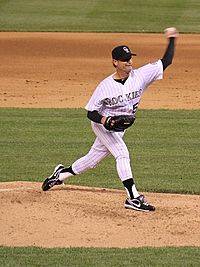
On April 17, Jamie Moyer became the oldest pitcher in MLB history to earn a win. The previous record was held by Jack Quinn, who earned his last win in 1932. Moyer became the oldest player in MLB history to get an RBI on May 16. He singled in two runs in the fourth inning against the Arizona Diamondbacks. He also extended his record for the oldest pitcher to get a win. Five days later, Moyer started for the Rockies against the Marlins at Marlins Park. This was the 50th MLB stadium Moyer had pitched in, which is the most for any pitcher who started playing after 1900.
On June 4, the Rockies released Moyer. This made him a free agent, able to sign with any team. He had a 2–5 record in 10 starts for the Rockies.
Brief Returns to Other Teams (2012)
Moyer signed a minor league deal with the Baltimore Orioles on June 6, two days after being released by the Rockies. The deal said he would make three starts with the Triple-A Norfolk Tides. After that, the Orioles had to promote him or let him go. After his third start on June 23, the Orioles offered Moyer another start with the Tides. He chose to become a free agent instead. With the Tides, Moyer had a 1–1 record with a 1.69 ERA and 16 strikeouts in 16 innings over three games. He also showed great control, as he did not walk any batters and allowed only 11 hits.
Moyer signed a minor league contract with the Toronto Blue Jays after being released by the Orioles. Moyer made his first start for the Blue Jays Triple-A team, the Las Vegas 51s, on June 28. Moyer got the win, pitching five innings and giving up three runs on seven hits. He had six strikeouts and one walk. Moyer's second start was a loss to the Reno Aces. He gave up seven runs on 10 hits through six innings. In his two planned starts with Las Vegas, Moyer had a 1–1 record with an 8.18 ERA through 11 innings. On July 5, he was released by Toronto.
Retirement and Beyond (2013)
On September 7, 2013, it was reported that Moyer was trying to make a comeback as a knuckleball pitcher. He had talked with Charlie Hough and Tim Wakefield that summer.
Moyer announced the end of his baseball-playing career during an interview on National Public Radio on October 2, 2013. During the interview, he also announced his plan to start a pitching academy, The Moyer Pitching Academy. He also planned to continue his charity work with The Moyer Foundation. He said he would be open to an offer to coach in the major leagues.
Moyer wrote a book with Larry Platt called Just Tell Me I Can't: How Jamie Moyer Defied the Radar Gun and Defeated Time. Moyer dedicated the book and sees the academy as a tribute to the late counselor and author Harvey Dorfman. Dorfman helped Moyer with his "mental game."
In 2018, Moyer appeared on the BBWAA Hall of Fame ballot for the first time. He received 10 votes but did not get enough votes to stay on the ballot for future years.
Broadcasting Career (2014)
On February 11, 2014, it was announced that Moyer and former Phillie Matt Stairs would join the Phillies' television broadcast team. They would be color analysts for the 2014 season. Moyer and Stairs joined in-game reporter Gregg Murphy and play-by-play announcer Tom McCarthy. After the season, Moyer announced he would not return to the booth in 2015. He said he wanted to spend more time with his family.
Pitching Style
Moyer's way of pitching changed as he got older. Most pitchers lose speed on their pitches later in their careers, and Moyer was the same. His average fastball speed in 2012 was about 80 MPH. This is very slow for a pitcher who doesn't throw a knuckleball. Instead of speed, Moyer relied on being very accurate and mixing up his pitches. He threw five main pitches: a sinker, a cut fastball, a slider, a changeup, and a curveball.
Personal Life
In 1996, Moyer earned a degree from Indiana University.
Moyer was married to Karen Phelps, who is the daughter of former Notre Dame basketball coach Digger Phelps. They met through Harry Caray when Moyer was with the Cubs. Karen was an intern with the Cubs' broadcast station, WGN. They were married in a Catholic ceremony and had eight children. Moyer and Karen divorced in 2017.
Moyer's oldest son, Dillon, was drafted by the Minnesota Twins in 2010 but chose to go to college. He later signed with the Los Angeles Dodgers in 2013. Another son, Hutton, was drafted in 2015.
In 2000, Moyer and Karen Phelps Moyer started Eluna. This organization helps children who are going through tough times.
See also
- Home runs allowed
- List of Major League Baseball career wins leaders
- List of Major League Baseball players who played in four decades
- List of oldest Major League Baseball players
- List of Major League Baseball career hit batsmen leaders
- List of Major League Baseball career strikeout leaders
 | Shirley Ann Jackson |
 | Garett Morgan |
 | J. Ernest Wilkins Jr. |
 | Elijah McCoy |


